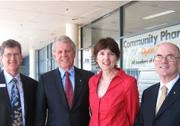Cutting-edge care
UNSW has joined forces with leading hospitals and medical research bodies to form one of Australia's biggest advanced treatment and research centres.
UNSW has joined forces with leading hospitals and medical research bodies to form one of Australia's biggest advanced treatment and research centres.

UNSW has joined forces with some of the country's top hospitals and medical research bodies to form one of Australia's biggest advanced medical treatment and research centres.
The Academic Health Sciences Centre (AHSC), to be located in Randwick, will integrate research, training and clinical expertise to provide cutting-edge treatments to the community.
A council has been formed to implement the collaboration from mid-year.
UNSW Medicine will join with the Prince of Wales Hospital, the Royal Hospital for Women, Sydney Children's Hospital, the UTS Faculty of Nursing, Midwifery and Health and four research institutes - the Black Dog Institute, Children's Cancer Institute Australia, Neuroscience Research Australia and the Eastern Heart Clinic - to form the centre.
US operations such as the Mayo Clinic that focus on research-based treatments were the inspiration behind the collaboration.
"This is the first step in a major change to the way health research, teaching and treatment are carried out in this country," said Peter Joseph, Chair of the group.
"The Centre takes advantage of a location, Randwick, where three major hospitals and four medical research institutes co-exist with a university medical school and biological sciences facilities," said Mr Joseph, who also Chairs the Board of the Black Dog Institute, one of the AHSC's foundation organisations.
"The AHSC will unite the three areas critical to improving outcomes for patients and the community - research, education and clinical care," said UNSW Professor Robyn Ward, cancer researcher and Director of Prince of Wales Hospital Clinical School.
Professor Ward said the Centre would help patients with complex cases to receive cutting edge care. "It will allow the discoveries being made all over the world and locally to be applied to patients," she told the Sydney Morning Herald.
Senior Associate Dean of UNSW Medicine Professor Terry Campbell said the scale of the AHSC's structured and cohesive approach to healthcare had never before been seen in Australia.
"Finding answers and advancing them to the clinic and applying them to patients must become a smoother, faster process," he said. "By speeding up and filling the gaps between the laboratory 'bench to bedside' and 'bedside to population,' the Centre can transform the way medicine is practised in this country."
Media contact: Steve Offner, UNSW Media Office | 02 9385 8107